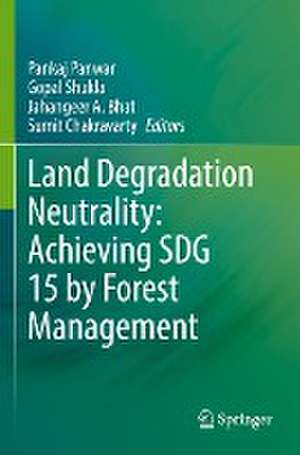Land Degradation Neutrality: Achieving SDG 15 by Forest Management
Editat de Pankaj Panwar, Gopal Shukla, Jahangeer A. Bhat, Sumit Chakravartyen Limba Engleză Paperback – 19 oct 2023
| Toate formatele și edițiile | Preț | Express |
|---|---|---|
| Paperback (1) | 952.72 lei 6-8 săpt. | |
| Springer Nature Singapore – 19 oct 2023 | 952.72 lei 6-8 săpt. | |
| Hardback (1) | 958.88 lei 6-8 săpt. | |
| Springer Nature Singapore – 18 oct 2022 | 958.88 lei 6-8 săpt. |
Preț: 952.72 lei
Preț vechi: 1161.85 lei
-18% Nou
Puncte Express: 1429
Preț estimativ în valută:
182.29€ • 190.35$ • 150.54£
182.29€ • 190.35$ • 150.54£
Carte tipărită la comandă
Livrare economică 15-29 aprilie
Preluare comenzi: 021 569.72.76
Specificații
ISBN-13: 9789811954801
ISBN-10: 9811954801
Ilustrații: XVI, 452 p. 1 illus.
Dimensiuni: 155 x 235 mm
Greutate: 0.65 kg
Ediția:1st ed. 2022
Editura: Springer Nature Singapore
Colecția Springer
Locul publicării:Singapore, Singapore
ISBN-10: 9811954801
Ilustrații: XVI, 452 p. 1 illus.
Dimensiuni: 155 x 235 mm
Greutate: 0.65 kg
Ediția:1st ed. 2022
Editura: Springer Nature Singapore
Colecția Springer
Locul publicării:Singapore, Singapore
Cuprins
chapter 1. Forest Resources of the World: Present Status and Future Prospectus.- Chapter 2. Effect of Deforestation and Forest Fragmentation on Ecosystem Services.- Chapter 3. Impact of Deforestation on Faunal Diversity and Its Management Strategies.- Chapter 4. Drivers of Deforestation, Forest Degradation and Management Responses in Ghana.- Chapter 5. Forest Degradation in Nigeria: Case Study of Rugu Forest Reserve, Katsina State.- Chapter 6.Deforestation and Degradation in the Mangrove Ecosystem: Implication on Environment and Livelihoods.- Chapter 7. Assessing Land Degradation using SDG 15.3.1 Indicators: Case Study from Climatevulnerable Assam State of India.- Chapter 8. Benefits and Risks Analysis of a Novel Nomadic Practice in Northeast China.- Chapter 9.Soil Degradation: Causes, Consequences and Analytical Tools.- Chapter 10. Accountability of Woody Plants for Restoring Degraded Forest Landscapes and Provision for Ecosystem Services: An overview.- Chapter 11. Ecological Restoration of Degraded Forests for Achieving Land Degradation Neutrality.- Chapter 12. Tree Plantation: A Silver Bullet to Achieve Carbon Neutrality.- Chapter 13. Role of Protected Area in Conservation and Sustainable Management of Biodiversity: An Indian Perspective.- Chapter 14. Structure, Pattern and Composition of Riparian Vegetation in North-Western Himalayas, India.- Chapter 15. Land Degradation Neutrality in Coastal India: Case of Mobius' Strip Linking Pedodiversity and Biodiversity.- Chapter 16. Role of REDD+ in reducing Land Degradation and Achieving SDGs.- Chapter 17. Carbon Sequestration Acts as a Moderator for Soil Restoration of Degraded Coal Mined Lands: An Overview.- Chapter 18. Nature Conservation Effects on Forest Carbon Sequestration, Biodiversity of Plants and Macro-fungi: A Case Study in Central Lesser Khingan Mountains, NE China.- Chapter 19. Urban Forest Resources: A Strategy for Achieving Land Degradation Neutrality.- Chapter 20. Soil Nitrogen Dynamics and Management in Agroforestry Systems for Ecological Sustainability.- Chapter 21. Land Degradation Neutrality for Achieving Climate Resilience in Agriculture.- Chapter 22. NTFP and Homegarden vis-à-vis Land Degradation Neutrality: Sustainable Livelihood and development.- Chapter 23. Indian Forests: Sustainable Uses and Its Role in Livelihood Security.
Notă biografică
Dr. Pankaj Panwar, Principal Scientist, ICAR-Indian Institute of Soil and Water Conservation, Research Center Chandigarh, Sector 27 A, Madhya Marg, Chandigarh - 160 019, India
Dr. Gopal Shukla, Assistant Professor, Department of Forestry, Uttar Banga Krishi Viswavidyalaya, Pundibari-736165, Cooch Behar, West Bengal, India
Dr. Jahangeer A. Bhat, Scientist, Rani Lakshmi Bai Central Agricultural University, College of Horticulture and Forestry, Rani Lakshmi Bai Central Agricultural University, Gwalior Road, Jhansi -284003, Uttar Pradesh, India
Dr. Sumit Chakravarty, Professor & Head, Department of Forestry, Uttar Banga Krishi Viswavidyalaya, Pundibari-736165, Cooch Behar, West Bengal, India Textul de pe ultima copertă
This edited book covers all aspects of forest deforestation and degradation in detail and their link to land degradation. Poor natural resource management is often a contributory factor in the depletion of resources particularly like degradation of land which hinders the goals to achieve land degradation neutrality (LDN). Sustainable Development Goal (SDG) target 15.3 states: “By 2030, combat desertification, restore degraded land and soil, including land affected by desertification, drought, and floods, and strive to achieve a land degradation-neutral world.” To achieve the set goals a comprehensive multidirectional approach is required involving policymakers, field functionaries, researchers, and above all educators. The book compiles the field experiences and wisdom of some of the best researchers and authors working in the field of land degradations for quite a long time. The objective of the book is to disseminate the status of land degradation, the importance of achieving land degradation and share success stories of reclaiming Land degradation, and suggests means and ways of achieving land degradation neutrality. This book act as a repository of knowledge on Land degradation neutrality for students, researchers and practitioners, and policy planners.
Caracteristici
Addresses emerging issues of forest ecosystem management, carbon sequestration, carbon credit and carbon farming
Compiles effect of deforestation on livelihood security of forest fringe communities, on biodiversity and climate change
Suggests strategies for achieving land degradation neutrality
Compiles effect of deforestation on livelihood security of forest fringe communities, on biodiversity and climate change
Suggests strategies for achieving land degradation neutrality
